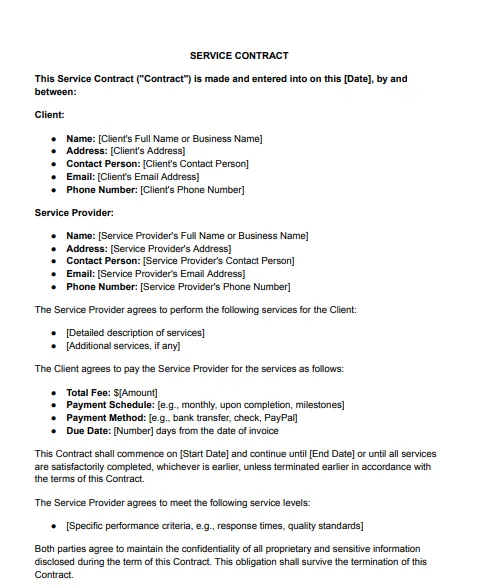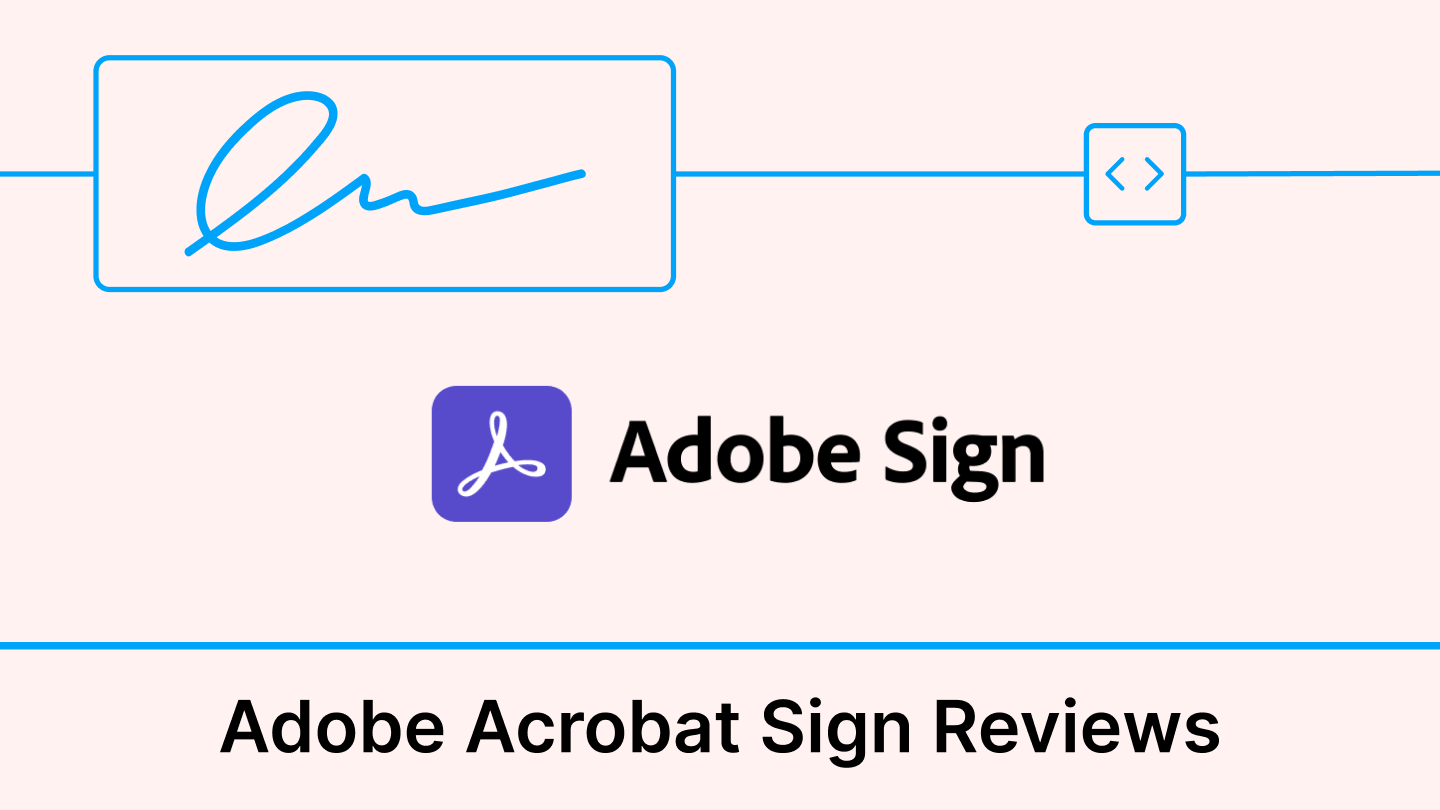Simply put, service contracts exist because saying “I give you my word” isn’t enough when it comes to business transactions.
It takes legally binding, enforceable agreements to define the terms and conditions under which services are provided and to safeguard the rights of service providers and their customers.
In this blog, we’ll explore the fundamental aspects of service contracts or contracts for services: what they are, their key components, types, and their importance in various industries.
What is a service contract?
A service contract is a formal agreement between a service provider and a client. It outlines the terms and conditions under which services will be provided.
These contracts are essential agreements that ensure clarity and mutual understanding between the service provider and the client.
Contracts of service outline the scope of services, performance standards, payment terms, and the responsibilities of both parties.
By specifying these details, service contracts help prevent misunderstandings, establish expectations, and provide a framework for resolving disputes.
Whether in business-to-business transactions or between individual consumers and service providers, service contracts play an important role in facilitating smooth and effective service delivery.
Types of service contracts
There are six types of service contracts:
1. General service contract
A general service contract is a formal agreement between a service provider and a client that establishes the terms and conditions under which specified services will be delivered.
This contract is designed to ensure that both parties have a clear understanding of their roles, responsibilities, and expectations, thereby minimizing the risk of disputes and misunderstandings.
Typically, such contracts for services include detailed descriptions of the services to be provided, performance standards that must be met, the timeframe within which the services will be delivered, and an outline of the payment terms.
Signeasy can help you streamline your operations as you can create reusable templates for general service contracts and send them for eSignatures to your clients or service providers without any hassles.
2. Product service contract
A product service contract, often referred to as an extended warranty or service agreement, is an agreement between the buyer of a product and the service provider (which could be the manufacturer, retailer, or a third-party service company) that provides repair and maintenance services for the product over a specified period.
This type of contract goes beyond the standard warranty that typically comes with a product, offering additional coverage for repairs, maintenance, and sometimes even replacement in case of product failure.
Product service contracts are common in industries such as electronics, appliances, automobiles, and other consumer goods. They provide peace of mind to consumers by protecting them against unexpected repair costs and ensuring that their products are maintained in good working condition.
For businesses, offering service contracts can enhance customer satisfaction and loyalty by providing ongoing support and service beyond the initial sale.
3. Consultant service contract
A consultant service contract is a formal agreement between a consultant (an individual or a consulting firm) and a client (a company or an individual) that outlines the terms and conditions under which consulting services will be provided.
This type of contract is important for defining the scope of work, responsibilities, and expectations, ensuring that both parties are clear about their obligations.
It establishes a clear, legally binding framework that protects the interests of both the consultant and the client.
Example: A consulting service contract should be used when a procurement consultant is hired to provide expertise and advice on procurement strategies, process optimization, supplier management, and cost reduction. Signeasy allows you to create a contract for services template in a few easy steps.
4. Artist service contract
An artist service contract is a formal agreement between an artist and a client (which could be an individual, a company, or an organization) that outlines the terms and conditions under which the artist will provide specific services.
This type of contract ensures that both parties have a clear understanding of their roles, responsibilities, and expectations, providing legal protection and setting the framework for a successful collaboration.
Some scenarios in which such a contract can be used are when an individual commissions a painter to create a custom piece of art for their home, a music festival organizer hires a band to perform at an event, a gallery agrees to exhibit an artist or sculptor’s works for a specified period, or when a company engages a graphic designer to develop a new logo and branding materials.
5. Managed services contract
Managed services contracts are agreements between a service provider and a client in which the provider takes on the responsibility for managing and delivering a set of defined services on an ongoing basis.
These contracts are typically used in industries where continuous support and maintenance are critical, such as IT, telecommunications, and facility management.
The service provider ensures that the client’s systems and operations run smoothly, efficiently, and securely, often including monitoring, management, and proactive maintenance.
6. Retainer agreement
A retainer agreement is a contract between a client and a service provider, typically for legal services or hiring a professional such as a consultant or freelancer, in which the client pays an advance fee or retainer to secure the provider's services for a specified period or project.
This type of contract for services outlines the terms and conditions under which the services will be provided, ensuring that the service provider is available to the client when needed.
Retainer agreements are commonly used to establish an ongoing working relationship, providing both parties with stability and predictability.
What should you include in a contract for services?
Creating a comprehensive service contract lays the foundation for clear communication and mutual understanding between the service provider and the client. Here are the key elements you should include in a service contract:
Parties involved
Clearly identify the service provider and the client. Include full legal names, addresses, and contact information for both parties. This ensures that there is no ambiguity about who is entering into the agreement.
Scope of services
Provide a detailed description of the services to be provided. This section should outline what is included and, if necessary, what is excluded. Specify the tasks, deliverables, and any particular requirements or standards to be met. A well-defined scope helps prevent scope creep and ensures both parties have the same expectations.
Performance standards
Define the quality and performance standards for the services. This may include specific metrics, such as response times, resolution times, and uptime percentages. These standards set clear expectations for the level of service and provide a basis for measuring performance.
Duration of the contract
Contracts for services should specify the start and end dates of the contract. If the contract is ongoing, include the terms for renewal or termination. This section ensures that both parties know the timeframe of their obligations and any conditions for extending or ending the agreement.
Payment terms
Outline the payment structure, including the total cost, payment schedule, due dates, and acceptable payment methods. Include details about any upfront fees, deposits, or milestones tied to payments. This section helps avoid misunderstandings about financial obligations.
Responsibilities and obligations
Clearly define the responsibilities of both the service provider and the client. This may include providing necessary resources, information, or access to facilities. Ensuring that both parties understand their roles can prevent delays and miscommunication.
Confidentiality
Include a confidentiality clause to protect any sensitive information shared during the contract. This section should specify what information is considered confidential, how it should be handled, and the consequences of a breach.
Liability and indemnification
Define the extent of liability for both parties in case of damages or losses. Include indemnification clauses that outline how one party will compensate the other for any claims, damages, or losses arising from the contract. This section protects both parties from unforeseen legal or financial risks.
Dispute resolution
Detail the process for resolving disputes that may arise during the contract. This can include negotiation, mediation, arbitration, or litigation. Having a clear dispute resolution mechanism helps manage conflicts efficiently and can prevent costly legal battles.
Termination conditions
Airtight contracts for services specify the conditions under which the contract can be terminated by either party. This may include breach of contract, failure to meet performance standards, or other specific conditions. Include notice periods and any penalties or consequences for early termination.
Amendments
Outline the process for making changes to the contract. This section should specify how amendments will be documented and agreed upon by both parties. A clear amendment process ensures that any necessary changes are made transparently and with mutual consent.
Governing law
Indicate the legal jurisdiction that will govern the contract. This is particularly important in international agreements where parties may be in different legal jurisdictions. Knowing which laws apply can help in resolving any legal issues that arise.
Signatures
Ensure that the contract is signed by authorized representatives of both parties. Signatures validate the agreement and demonstrate that both parties have read, understood, and agreed to the terms.
Appendices or attachments
Include any additional documents or appendices that are relevant to the contract. This could be detailed schedules, technical specifications, or any other supporting materials that provide further clarity to the agreement.
Importance of service contracts and why you need them
Creating a service contract is important for many reasons:
1. Clarity and understanding
A service contract helps define the scope of work. It specifies the services to be provided, what is included, and what is not. This helps avoid misunderstandings and scope creep, and makes it obvious where additional tasks are requested without proper compensation.
It outlines the responsibilities of both the service provider and the client, ensuring each party knows what is expected of them. This can include providing necessary resources, information, or access to facilities.
2. Legal protection
A service contract serves as a legally binding document that protects both parties in case of disputes. It provides a basis for legal recourse if one party fails to fulfill their obligations.
The contract can include clauses that limit the liability of the service provider and protect both parties from potential legal claims. Indemnification clauses can ensure that one party is not held responsible for the other's negligence or misconduct.
3. Financial security
A service contract clearly states the payment terms, including the amount, schedule, and method of payment. This ensures that the service provider is compensated fairly and on time for their work.
The contract can outline the process for resolving any disputes that arise, such as mediation, arbitration, or litigation. This provides a structured approach to addressing conflicts, potentially saving time and money.
4. Performance and accountability
Contracts for services can help set performance standards and metrics, such as response times, resolution times, and quality benchmarks. This holds the service provider accountable for delivering high-quality work.
The contract can establish deadlines and key milestones, ensuring that the project progresses as planned and that both parties stay on track.
5. Confidentiality and intellectual property
A service contract can include non-disclosure agreements (NDAs) to protect sensitive information shared during the course of the work. This ensures that proprietary or confidential information is not disclosed to third parties.
The contract can specify who owns the intellectual property created during the engagement. This is particularly important for creative or technical work, ensuring that ownership rights are clearly defined and respected.
6. Professionalism and trust
A well-drafted service contract demonstrates professionalism and can build trust between the service provider and the client. It shows that both parties are committed to a formal, structured relationship.
By clearly outlining all aspects of the service relationship, a contract reduces the risk of miscommunication, unmet expectations, and potential legal issues. It provides a clear reference point for both parties throughout the engagement.
A step-by-step guide to draft a service contract
Drafting a service contract requires careful attention to detail. Here’s a step-by-step guide for drafting a service contract:
1. Label the document appropriately
Start by clearly labeling the document as a Service Contract to establish its purpose. For example, "Service Agreement" or "Consulting Service Contract."
2. Identify the parties involved
Begin by stating the names and contact details of the parties involved. Specify whether they are individuals, businesses, or organizations. For example, "This agreement is made between [Service Provider Name], hereafter referred to as 'Provider,' and [Client Name], hereafter referred to as 'Client.'"
3. Define the scope of services
Clearly describe the services the provider will deliver. This section should be as detailed as possible, specifying what tasks will be performed, how they will be done, and any deliverables or milestones. For example, "The Provider agrees to deliver IT consulting services, including network setup, security audits, and system maintenance."
4. Outline payment terms
Outline the payment structure, including the amount, payment schedule, and accepted methods. Specify whether payments will be made as a lump sum, in installments, or based on hourly rates. Also, include any late fees or penalties for missed payments. For example, "Client agrees to pay the Provider $500 per month, due on the 1st of each month."
5. Specify the contract duration
State the start date and, if applicable, the end date of the contract. If the contract is ongoing, mention the duration (e.g., one year) and any renewal terms. For example, "This agreement shall commence on [Start Date] and continue for a period of 12 months."
6. Define service level expectations
If relevant, specify the service level expectations, including response times, resolution times, availability, and performance metrics. For example, "The Provider agrees to respond to technical support requests within 24 hours."
7. Clarify roles and responsibilities
Clearly define the duties and obligations of both the service provider and the client. This ensures that each party knows what is expected of them. For example, "The Client agrees to provide the Provider with access to necessary systems and resources for the duration of the service."
8. Include confidentiality clauses
Include clauses to protect any sensitive or proprietary information exchanged during the contract period. For example, "Both parties agree to maintain confidentiality regarding all business operations, trade secrets, and proprietary information."
9. Address liability and indemnification
Address any liability issues, specifying who is responsible for what in case of loss, damage, or legal issues arising from the services. Include indemnification clauses where applicable. For example, "The Provider will not be liable for any indirect or consequential damages arising from the use of the provided services."
10. Outline dispute resolution methods
Specify how disputes will be handled, such as through negotiation, mediation, or arbitration. Mention the jurisdiction or legal venue for resolving any issues. For example, "Any disputes arising from this contract shall be resolved through mediation in [Location]."
11. Define termination conditions
Clearly state the conditions under which the contract can be terminated, such as breach of contract, failure to meet performance standards, or mutual agreement. Include any required notice periods and any penalties for early termination. For example, "Either party may terminate this agreement with 30 days' written notice."
12. Assign intellectual property rights
If the contract involves the creation of intellectual property (such as designs, software, or content), define who owns the intellectual property created during the service. For example, "Any software developed during the course of this contract shall remain the property of the Client."
13. Specify governing law
Specify which jurisdiction’s laws will govern the contract. For example, "This agreement shall be governed by the laws of the state of [State/Country]."
14. Add additional clauses if necessary
Add any additional clauses that may be relevant, such as force majeure (unexpected events), entire agreement (the contract is the full and only agreement), or assignment (whether the contract can be transferred to another party).
15. Provide spaces for signatures
Finally, include spaces for both parties to sign and date the contract, confirming their agreement to the terms. For example, "By signing below, both parties agree to the terms and conditions set forth in this Service Contract."
Additional tips for drafting a service contract
When drafting a service contract, there are a few important things to keep in mind to ensure that the agreement is clear, fair, and legally sound:
- Be clear and specific: Avoid vague language and ensure that the terms are specific to prevent confusion and potential disputes.
- Consult a lawyer: If possible, have a legal professional review the contract to ensure it complies with relevant laws and best practices.
- Keep it simple: While it’s important to include necessary details, keep the contract straightforward and easy to understand for both parties.
- Update as needed: Periodically review and revise the contract to make sure it reflects the current working relationship and any changes to services or payment terms.
Contract for services template
Here’s a sample contract for services template that you can add to your library on Signeasy. Just edit the details as and when you need a fresh contract for a new service or service provider.


Note: Be sure to customize the template with specific details relevant to the services being provided and the agreement between the parties. Also, it is advisable to have a legal professional review the contract to ensure compliance with relevant laws and regulations.
How service contracts work in different industries
Contracts for services provide a clear framework that helps manage expectations, ensure accountability, and reduce the risk of conflicts, ultimately leading to more efficient and reliable service delivery.
Here are a few examples highlighting their importance across major industries:
1. Information Technology (IT)
In the IT industry, service contracts are vital for defining the level of service provided by IT companies to their clients.
For example, an IT service contract might specify the guaranteed uptime for a website or software system, response times for technical support, and the procedures for handling outages or breaches.
These contracts ensure that businesses can rely on their IT infrastructure to operate smoothly and address any issues promptly, minimizing downtime and productivity losses.
2. Healthcare
In healthcare, service contracts between hospitals and medical equipment suppliers are crucial.
These contracts detail the maintenance schedules, response times for repairs, and the provision of replacement parts for medical devices such as MRI machines or ventilators.
Such agreements ensure that critical medical equipment is always in working condition, thereby safeguarding patient care and reducing the risk of equipment failure during essential medical procedures.
3. Construction
Construction companies rely heavily on service contracts with subcontractors and suppliers.
These contracts specify the quality of materials to be used, deadlines for project milestones, and safety standards to be maintained on the construction site.
By having clear agreements in place, construction firms can ensure that projects are completed on time, within budget, and to the required standards, thus avoiding costly delays and legal disputes.
4. Telecommunications
In the telecommunications industry, service contracts between service providers and consumers or businesses outline the terms of service for internet, phone, and cable services.
These contracts detail the speed of internet connections, data limits, customer support availability, and terms for service outages.
This clarity helps consumers understand what to expect from their service providers and provides a basis for accountability if the service does not meet the agreed standards.
5. Facility management
Companies that provide facility management services, such as cleaning, security, and maintenance, use service contracts to define the scope and frequency of services.
For instance, a service contract for cleaning services might specify how often different areas of a building are cleaned, the cleaning standards to be met, and the procedures for addressing any issues.
These contracts ensure that the facilities are well-maintained and meet the client's expectations, enhancing the overall environment for employees and visitors.
Conclusion
Creating a service contract is essential for establishing a clear, professional, and legally protected relationship between a service provider and a client. It provides clarity, ensures accountability, protects intellectual property, and helps manage expectations, ultimately contributing to the success of the project or ongoing service.












